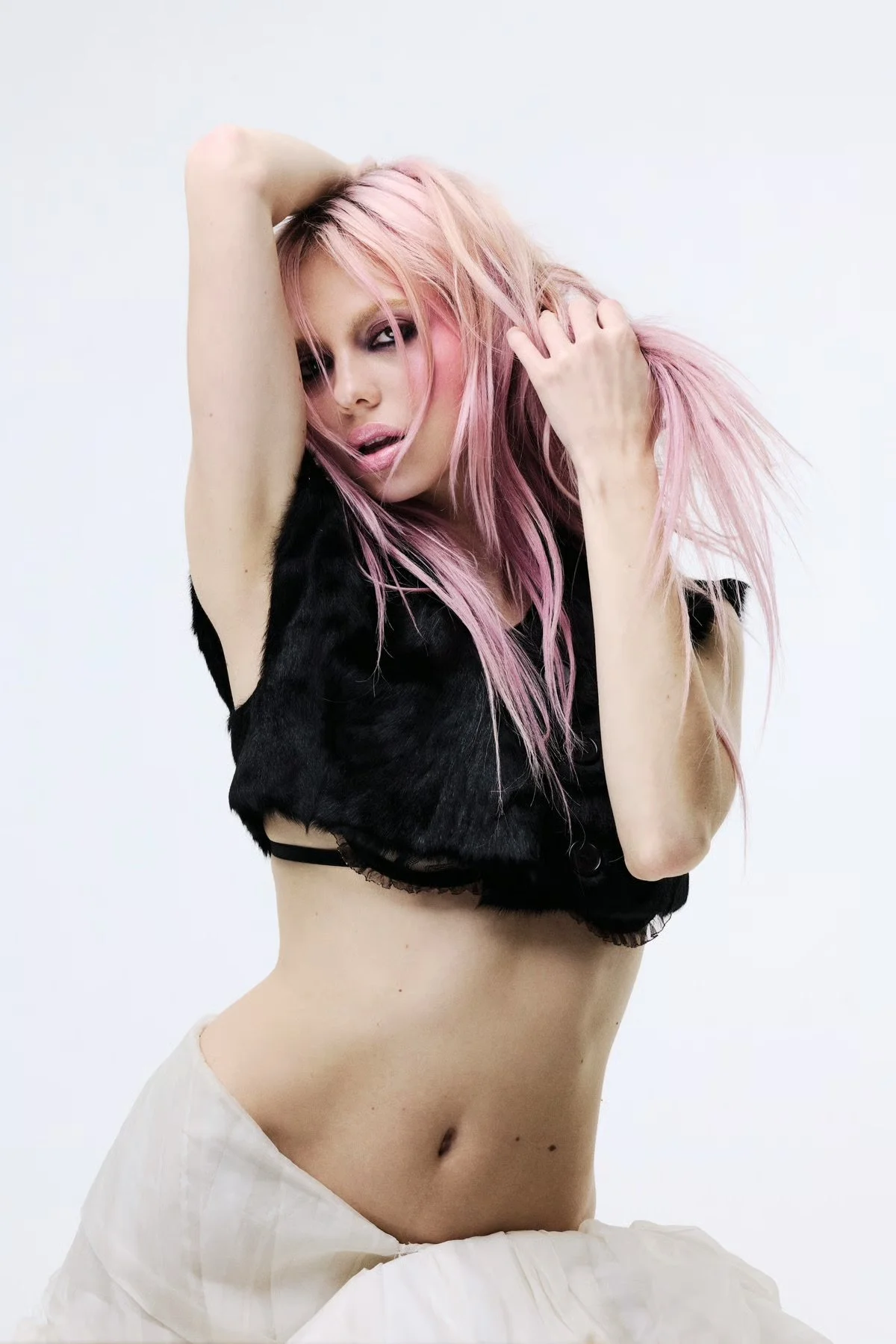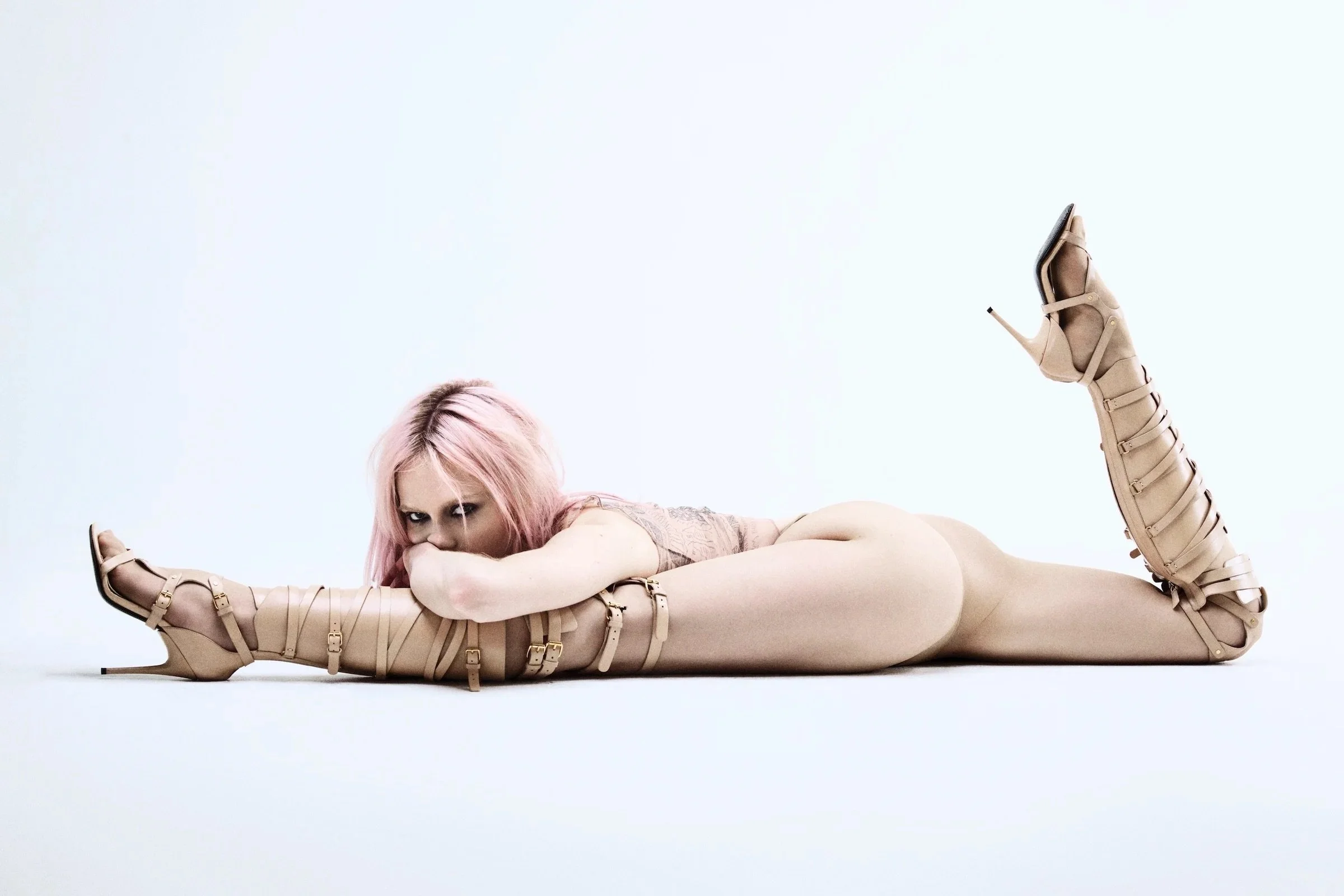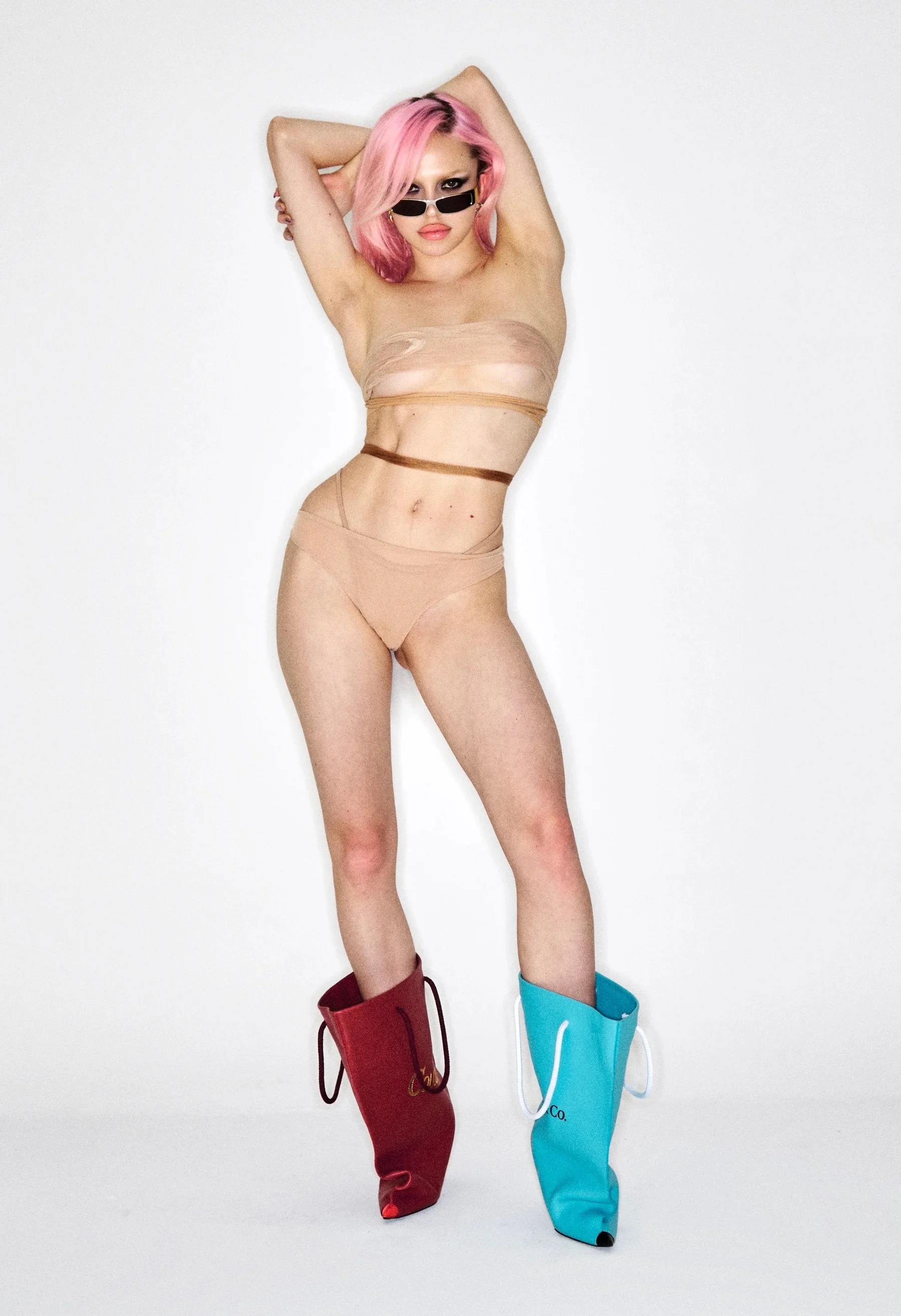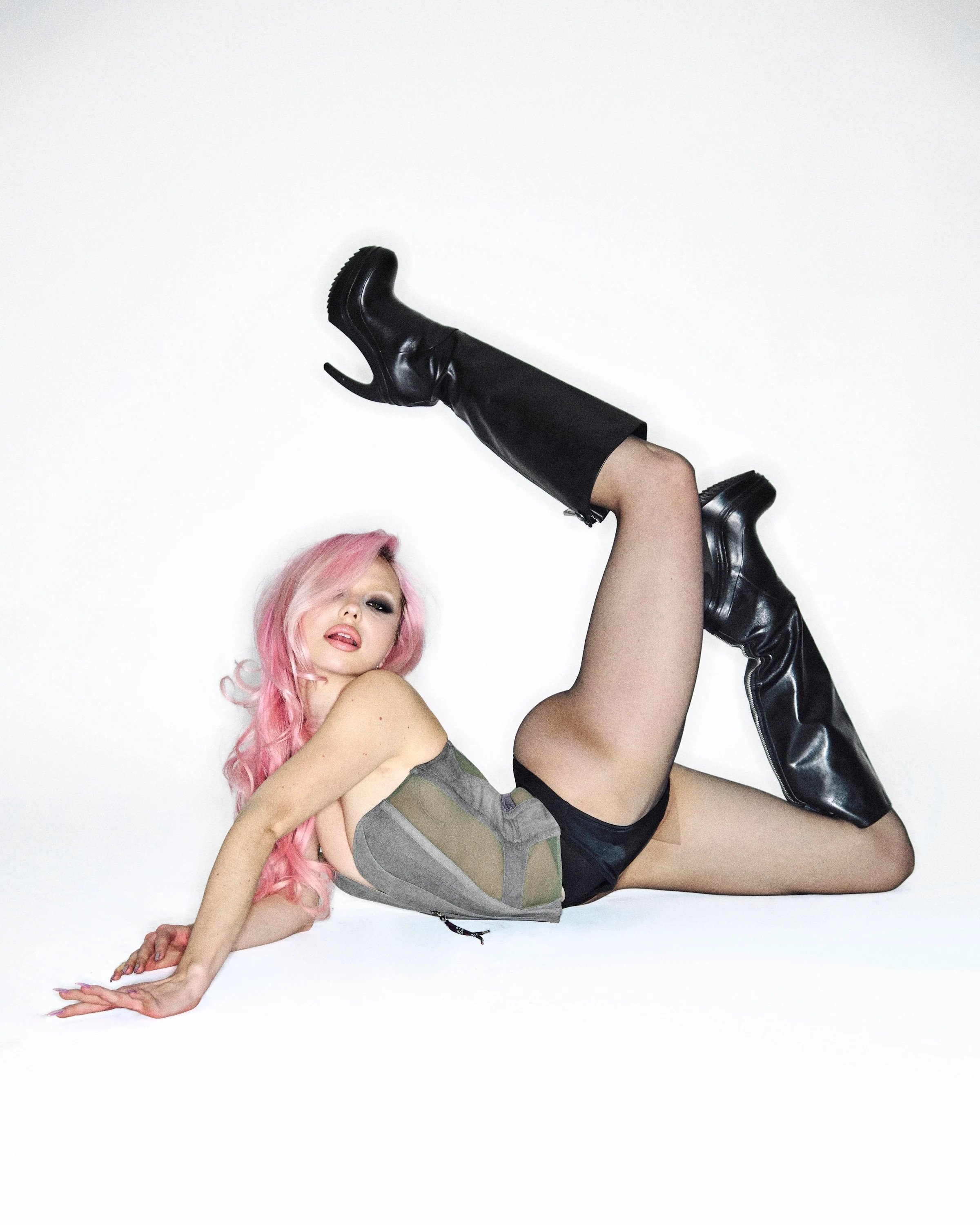on our radar:
Yell at the Machine, Girl: Adéla's Rise
from K-Pop Trainee to Pop's New Provocateur"
Written By Andy Levo
Nov 5th, 2025
"I thought that I would be fine with kind of being a product quote unquote if it meant making it, but I'm not. I can't do it."
There’s opportunities that you just don’t say no to. The chance to become a member of a new kind of group that takes the prolific, disciplined approach of K-Pop and focuses it directly on western audiences sounds like the dream gig of a young ballet dancer and aspiring artist from a small town in Slovakia. Adéla Jergová, who goes by her own name, knew she only had one chance to make a strong impression.
She was auditioning for The Debut: Dream Academy, the high-stakes Netflix reality series chronicling HYBE’s (the company behind BTS) and Geffen’s creation of its first truly global girl group, KATSEYE. The mission was clear: take the K-Pop system, its boot camp rigor, its discipline, its perfectionism, and apply it to a group meant to compete directly on the Billboard charts.
“she’s a great performer, but she doesn’t blend in well when she’s not in the front.”
Traditional K-Pop groups are meticulously crafted acts. Every lyric, dance move, look & performance is carefully created and curated by the industry’s most experienced producers and directors, all behind the scenes. The members of these groups are world-class performers, because anything short of continual excellence is quickly cut off. Perfection is not an aspiration, it’s a standard. And that includes each member putting themselves in service of what’s best for the group, forcing them to give up on fully expressing their artistry, opinions, and even their actual personalities.
During the first round of the show, one performer on team 1 stood out for all the wrong reasons. The judges’ critique or her performance on the first round of the competition more or less boiled down to “she’s a great performer, but she doesn’t blend in well when she’s not in the front.”
Adéla was now being confronted with the fact that her dedication to her craft and the passion with which she expressed it were stacking the deck against her. Despite her technical compliance, she was growing unhappy in a space that demanded she suppress her "true essence". The intense rigor of the training environment stripped away the facade, forcing her to confront a pivotal truth: she needed "creative freedom" and the space to be "messy and authentic".
This internal fracture led to her most crucial realization, one that crystallizes the ultimate cost of manufactured fame: "I thought that I would be fine with kind of being a product quote unquote if it meant making it, but I'm not. I can't do it."
But as you’ll come to find out, she’s not one to keep her words to herself. When Adéla spoke up in a group session about a perceived lack of effort among some trainees—an issue that had been noted by coaches—she was immediately cast as the villain. Her assertive honesty was punished with the swift, unforgiving brutality of the online masses. She became the "mean girl," receiving harassment and death threats for daring to deviate from the expected female idol persona. Her powerful, non-conforming image was instantly categorized and scapegoated, proving that her biggest liability was simply being too herself for the K-Pop machine to handle.
She was disqualified on the first round, and instead of giving up her pop star dreams, she doubled down on what made her stand out. She writes about her own experiences through a lens that expertly weaves her influences with some of the freshest Electro-Pop production I’ve heard since the early 2010s. Her music showcases talent, precision and range, in both the music and performances displayed in her live performances and music videos. The world she’s created around her persona feels intriguing, intense, raw and deeply personal, in a way that feels both vulnerable and empowering at the same time.
This radical autonomy defines her current work. She is not merely a performer; she is the brand. She writes her own songs, co-produces, and controls her theatrical, fashion-forward visuals. Her rapid success—signed to Capitol and Polydor and covered by Vogue and NYLON—is the ultimate proof that her individuality was, in fact, her most valuable asset. All of this is on display on her debut EP: “The Provocateur”
Beginning with "MachineGirl," a direct reclamation of the label brutally assigned to her online. The song is not a tearful apology, but a "razor sharp critique" that threw the question back at the audience, demanding they look at the source of the problem. She interrogated the entire algorithmic feedback loop that requires women to be flattened into a digestible image, essentially asking: “Mean Girl, what’s that even mean, Girl? Why are you coming at me? Yell at the machine, girl.
Tracks like “SexOnTheBeat” serve as a critique of the oversexualization of women in the music industry, while simultaneously acting as a powerful statement in agency and owning her sexuality to express it in a raw and unique way.
This philosophy culminates in the track "SUPERSCAR". This powerful mantra directly addresses the industry’s attempts at control. Adéla realized she was "not willing to just be really like controlled", choosing instead to wear her rejection as a badge of honor. As she states, "You didn't make me a superstar, you gave me the super scar."
Her music would feel right at home in a playlist with her biggest influences. She channels the structured chaos of Lady Gaga, futuristic glitz of Charlie XCX, powerful vocals and precise harmonies of Ariana, and the rebellious attitude of Britney Spears, as well as incorporating her background as a ballet dancer with elements of raw sexual energy in the way she dances and performs. Her sound and image are very fleshed out, in part a testament to her prominent artistic vision fused with high caliber collabs behind the scenes with artists like Grimes, Dylan Brady, and other important names in the Pop/Hyperpop world.
Adéla achieved something rare: she broke out of the global pop machine with her autonomy intact. Her technical excellence was not enough to save her in a system prioritizing cohesion, but it was exactly what sustained her when she chose independence. Her "failure" to become one member of the global girl group Katseye was, in reality, the greatest rejection she could’ve received. And if you go in the comments, you’ll know I’m not alone in thinking that.
"I thought that I would be fine with kind of being a “product” if it meant making it, but I'm not. I can't do it."
If you haven’t heard about her yet, I’m not worried, you probably will soon. She’s making waves in the Pop star world, and artists like Troye Sivan, Grimes, and others in that world have been spotted supporting her, and she just announced she’ll be opening for Demi Lovato on her "The It's Not That Deep Tour" from April-May of next year. Her releases have been solid so far, but if she manages to land a solid debut album alongside that tour, I can easily see her replicating the success of a Chappell Roan, who experienced a meteoric rise to stardom after releasing her highly praised Debut album “The Rise and Fall of a Midwest Princess” and opening for Olivia Rodrigo during the GUTS World Tour.
It seems like Adéla knows she’s destined for greatness, and she’s not taking it for granted. I’m excited to see how far she goes, I suspect it will be something truly amazing to witness.





